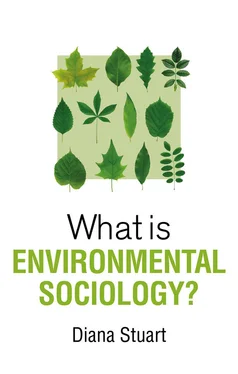1 Cover
2 Series Title
3 Title Page What is Environmental Sociology? DIANA STUART polity
4 Copyright Page Copyright Page Copyright © Diana Stuart 2021 The right of Diana Stuart to be identified as Author of this Work has been asserted in accordance with the UK Copyright, Designs and Patents Act 1988. First published in 2021 by Polity Press Polity Press 65 Bridge Street Cambridge CB2 1UR, UK Polity Press 101 Station Landing Suite 300 Medford, MA 02155, USA All rights reserved. Except for the quotation of short passages for the purpose of criticism and review, no part of this publication may be reproduced, stored in a retrieval system or transmitted, in any form or by any means, electronic, mechanical, photocopying, recording or otherwise, without the prior permission of the publisher. ISBN-13: 978-1-5095-4438-7 ISBN-13: 978-1-5095-4439-4 (pb) A catalogue record for this book is available from the British Library. Library of Congress Cataloging-in-Publication Data Names: Stuart, Diana (Diana Lynne), 1979- author. Title: What is environmental sociology? / Diana Stuart. Description: Medford : Polity Press, 2021. | Series: What is sociology? | Includes bibliographical references and index. | Summary: “A succinct primer on how to think critically about society/environment interactions”-- Provided by publisher. Identifiers: LCCN 2021000067 (print) | LCCN 2021000068 (ebook) | ISBN 9781509544387 (hardback) | ISBN 9781509544394 (paperback) | ISBN 9781509544400 (epub) Subjects: LCSH: Environmental sociology. Classification: LCC GE195 .S7858 2021 (print) | LCC GE195 (ebook) | DDC 304.2--dc23 LC record available at https://lccn.loc.gov/2021000067 LC ebook record available at https://lccn.loc.gov/2021000068 by Fakenham Prepress Solutions, Fakenham, Norfolk NR21 8NL The publisher has used its best endeavours to ensure that the URLs for external websites referred to in this book are correct and active at the time of going to press. However, the publisher has no responsibility for the websites and can make no guarantee that a site will remain live or that the content is or will remain appropriate. Every effort has been made to trace all copyright holders, but if any have been overlooked the publisher will be pleased to include any necessary credits in any subsequent reprint or edition. For further information on Polity, visit our website: politybooks.com
5 Preface Preface My approach for this book was inspired by my experiences teaching undergraduate and graduate-level environmental sociology and environmental studies courses over the past ten years. In recent years, I have noticed a significant shift in student morale. The existential environmental threats we currently face, especially those posed by climate change, are impossible for students to ignore, and many feel powerless and defeated by the lack of meaningful action taken. In my courses, I actively work to counter these feelings, as they only help to ensure our current trajectory. I emphasize potential solutions and alternative pathways. I also find it critical to repeatedly communicate and illustrate that another way and a different future is possible. We are not simply “doomed,” as there are many paths left to choose from, some that offer much more positive social and ecological outcomes than others. There is tremendous work to be done to correct our current trajectory and steer a course toward the best future possible. Even if this path is through uncharted waters and the challenges are daunting, there is a moral imperative to keep going. We are also in an exciting moment in history, where public opinions have shifted and social movements are challenging the current system. At the same time, powerful groups are using vast financial resources to protect the status quo. In addition, unexpected events, like the Covid-19 pandemic, can quickly reshape what is politically and socially possible. Rather than feeling powerless and dreading the inevitable environmental disasters ahead, it remains critical that we keep working to justly minimize harm. Environmental sociologists continue to play a key role in this work. In this book, I highlight this work and focus on how environmental sociology can help us to address the escalating environmental threats we face and forge pathways for the best possible future.
6 1 Environmental Sociology: In Uncharted Waters In Uncharted Waters Navigating Nature and Society Public Environmental Sociology in an Age of Crisis Book Overview Discussion Questions Suggested Reading
7 2 The Social Dimensions of Environmental Impacts The Role of Science: How Do We Know? Environmental Impacts as Risks and Problems Environmental Impacts as Crises The Unequal Distribution of Impacts The Social Dimensions Matter Discussion Questions Suggested Reading
8 3 Examining Drivers of Environmental Impacts Global Drivers: Beyond Population Growth Individual and Household Drivers Structural Drivers The Role of Ideology Seeing the Whole Picture Discussion Questions Suggested Reading
9 4 Identifying Solutions The Big Picture Individual Solutions Modernization Reflexive Modernization Ecological Modernization Structural Changes Toward a New System? We Cannot Be Radical Enough Discussion Questions Suggested Reading
10 5 Moving Forward Social Movements and Social Change Growing Momentum for Change Moving Forward in Environmental Sociology Doing the Necessary Work Discussion Questions Suggested Reading
11 References Cited
12 Index
13 End User License Agreement
1 Cover
2 Table of Contents
3 Begin Reading
1 ii
2 iii
3 iv
4 vi
5 vii
6 viii
7 1
8 2
9 3
10 4
11 5
12 6
13 7
14 8
15 9
16 10
17 11
18 12
19 13
20 14
21 15
22 16
23 17
24 18
25 19
26 20
27 21
28 22
29 23
30 24
31 25
32 26
33 27
34 28
35 29
36 30
37 31
38 32
39 33
40 34
41 35
42 36
43 37
44 38
45 39
46 40
47 41
48 42
49 43
50 44
51 45
52 46
53 47
54 48
55 49
56 50
57 51
58 52
59 53
60 54
61 55
62 56
63 57
64 58
65 59
66 60
67 61
68 62
69 63
70 64
71 65
72 66
73 67
74 68
75 69
76 70
77 71
78 72
79 73
80 74
81 75
82 76
83 77
84 78
85 79
86 80
87 81
88 82
89 83
90 84
91 85
92 86
93 87
94 88
95 89
96 90
97 91
98 92
99 93
100 94
101 95
102 96
103 97
104 98
105 99
106 100
107 101
108 102
109 103
110 104
111 105
112 106
113 107
114 108
115 109
116 110
117 111
118 112
119 113
120 114
121 115
122 116
123 117
124 118
125 119
126 120
127 121
128 122
129 123
130 124
131 125
132 126
133 127
134 128
135 129
136 130
137 131
138 132
139 133
140 134
141 135
142 136
143 137
144 138
145 139
146 140
147 141
148 142
149 143
150 144
151 145
152 146
153 147
154 148
155 149
156 150
157 151
158 152
159 153
160 154
What is Environmental Sociology?
DIANA STUART
Читать дальше












